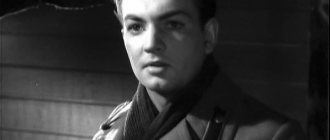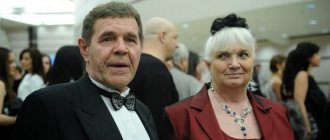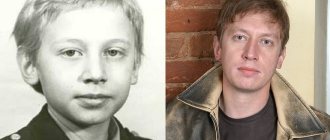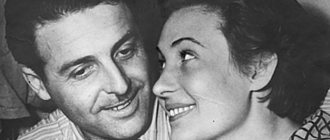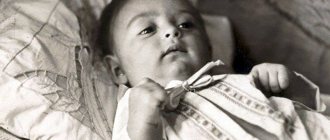Biography
Soviet cinema was very generous with legendary comedies and actors who, with their performances, ensured the love of the viewer for this movie. Among them is the wonderful artist Mikhail Pugovkin, remembered by the public for his roles in cult films like “Operation Y”, “Wedding in Malinovka”, “12 Chairs” and many others.
Actor Mikhail Pugovkin
Pugovkin was born on a warm summer day in 1923 in the village of Rameshki. His family lived very poorly, and from early childhood the boy had to help his parents, who worked hard in the fields. He brought them food and looked after their livestock. The school was located at a considerable distance from the village, and every day Misha went to study with other children. But due to poverty, the future actor was able to complete only 3 grades. Despite these hardships, Mikhail grew up as a very active and cheerful child who loved to sing and read ditties. Fellow villagers supported the guy’s hobby and often jokingly said that he would become a great artist. But Pugovkin himself really believed in it.
Mikhail Pugovkin at school
When he was ten years old, the boys took him to a neighboring village to watch a movie. The young man was greatly impressed by the film and firmly decided to become an actor. Friends just laughed at Misha, because life in Rameshki was not at all conducive to creativity or an artistic career.
In 1935, Pugovkin’s mother became seriously ill, and the only thing that could help her was an expensive operation, which was performed exclusively in Moscow. Then the family decided to move; they were warmly received by the boy’s aunt, who lived in a modest communal apartment. There was so little space that Mikhail had to sleep anywhere, and there was no question of lounging in bed. The future artist urgently had to look for work. At first, they didn’t want to take little Misha anywhere, citing his young age. Then Pugovkin gave himself a couple of years and got a job at a factory as an apprentice electrician.
Front-line actor Mikhail Pugovkin
Moscow became his chance to make his dream come true. The future actor enrolled in the drama club named after Kalyaev and spent all his free time there.
In 1941, the war began, and Pugovkin, of his own free will, went to the front to defend his homeland. He served as a scout, and in the second year of the war he was seriously wounded in the leg. There was a high probability that the limb would have to be amputated, and then Mikhail, who had regained consciousness for a while, persuaded the doctor to wait. Gangrene was cured, so the actor remained with his leg, even though it brought him a lot of trouble. There was no question of further service; Mikhail was sent home, awarded the Order of the Patriotic War, II degree.
The difficult wartime had a very sad effect on the Pugovkin family. To be able to feed the children, his mother had to steal pies from the bakery where she worked. She was reported and put in prison. Then Mikhail took advantage of his own position: he wrote to Stalin himself, thanks to which his mother was released.
Mikhail Pugovkin went through the war
In 1943, the actor set out to receive a full-fledged higher education. Then he actually managed to enter the Moscow Art Theater School, despite having only three classes at the school. The artist so impressed the admissions committee that they resorted to the trick of lying about the applicant’s certificate being lost during the war. However, the lack of basic knowledge soon made itself felt, since in the second year the artist was unable to pass several subjects, and was expelled from the school for poor performance. Immediately he received a summons to perform military service, and he was sent to a tank school. The actor instantly found a place in a local amateur group, which he headed by order of the head of the school.
Mikhail Pugovkin (real name Pugonkin) was born on a warm summer day on July 13, 1923 in the village of Rameshki, Chukhloma district, Yaroslavl region, as the third son in a poor peasant family. Both at home and in the village they affectionately called him Minka.
His family lived very poorly, and from early childhood the boy had to help his parents, who worked hard in the fields. He brought them food and looked after their livestock. The school was located at a considerable distance from the village, and every day Misha went to study with other children. But due to poverty, the future actor was able to complete only 3 grades. Despite these hardships, Minka grew up to be a very active and cheerful child.
Even then, Mikhail showed his acting talent at village weddings and holidays - he sang, performed jokes, dashingly danced the gypsy girl, the lady and the Russian Polish girl. And no one then could have thought that this little guy with a perky face would become the People's Artist of the USSR. In 1936, the family moved to Moscow; the parents wanted to give their children a good education and take them out of the hardships of rural life. They were warmly received by the boy’s aunt, who lived in a modest communal apartment.
In Moscow, Mikhail Pugovkin worked with his brothers at a brake factory as an electrician. Everyone loved him for his cheerful character and ingenuity. And after work, he studied in a drama club at the Kalyaev Club. I ran to the rehearsal, forgetting about everything. The meeting with the artistic director of the club, People's Artist of the RSFSR A.P. Shatov, became fateful for Mikhail. An experienced master recognized a natural artistic gift in the guy. It was he who entrusted Pugovkin with the main role of the merchant Bolshoi in A. Ostrovsky’s play “Our People – We Will Be Numbered” when the main performer fell ill. The actor learned not only his role, but the entire play in one night.
In this performance, he was noticed by the Honored Artist of the RSFSR F.M. Kaverin, who then headed the Moscow Drama Theater. He became interested in him and was amazed at the young boy’s performance. And here it is, a gift of fate - Mikhail Pugovkin was invited to a professional theater. Despite the fact that he did not even have a special education, the young man did not get lost among the masters.
Pugovkin started with episodic roles. He worked a lot and persistently. I had to make a lot of effort to improve my diction. And the artist successfully coped with this task, thereby earning the respect of F.M. Kaverin. Soon the audience began to admire Mikhail Pugovkin’s performance, and the press began to write about him
Pugovkin made his film debut on the eve of the Great War. The famous director G.A. Roshal invited him to star in the role of Stepasha in the film “The Artamonov Case”.
At the audition, Roshal asked if he could sing, dance, play, and there was only one answer to everything: “I can!” “Here is youth! Well, we’ll film it,” Roshal said. And Lyubov Orlova made her debut in the role of a young singer in this film. Before the film could be announced, the war began.
In 1941, following his father and brothers, Mikhail Pugovkin volunteered to go to the front. He ended up in the 1147th Infantry Regiment as a scout. However, the actor’s stay at the epicenter of hostilities turned out to be relatively short-lived. In October 1942, near Voroshilovgrad, Mikhail was seriously wounded in the leg. Gangrene begins. Doctors decide to amputate the leg above the knee. Become disabled at 18! That's it, you can give up on your dream of an acting career. He managed to beg the chief surgeon of the field hospital: “Doctor, I can’t lose my leg, I’m an artist!”
The disease receded slowly, the treatment lasted a long time. After the hospital, Mikhail was discharged from service and sent to Moscow. For his military services, the actor received the Order of the Patriotic War, II degree, as well as many other military awards. In 1943, Mikhail Pugovkin went to work at the only drama theater operating at that time - the Moscow Drama Theater - under the leadership of the chief director, People's Artist of the RSFSR N.M. Gorchakov, today it is the V. Mayakovsky Theater. Konstantin Simonov was the head of the musical department, and the leading artists were Valentina Serova and Rostislav Plyatt. At that time, the play “Moskvichka” was being rehearsed at the theater, and Pugovkin immediately received the role of Pyotr Ogonkov in it. The production was a huge success.
In 1943, at the height of the war, the V.I. Studio School was opened in Moscow at the Moscow Art Theater. Nemirovich-Danchenko, headed by director V.G. Sakhnovsky. Mikhail Pugovkin decided that he needed acting education...
And now - the exam. In the selection committee, V.I. Kachalov, I.M. Moskvin, N.P. Khmelev, A.K. Tarasova, A.I. Gribov... After looking through Mikhail Pugovkin’s documents, Moskvin exclaimed in surprise: “You are an artist!” Already an artist! And want to study? Besides, you have three years of education!” Despite the great excitement and lack of an education certificate, Mikhail Pugovkin successfully passed the entrance exams and was one of the first to be enrolled in the studio school.
Ivan Mikhailovich Moskvin was confident in the success of the talented young man, without hiding, he idolized the student Pugovkin, who studied with great pleasure, happily playing all the assigned roles. Mikhail Pugovkin's fellow students were: Vladlen Davydov, Alexey Pokrovsky, Igor Dmitriev, Andrey Goncharov, Vladimir Troshin, Irina Skobtseva.
In 1947, Pugovkin received a diploma from the Moscow Art Theater School and went to work at the Murmansk theater of the Northern Fleet. After this there was also a short period of work at the Vilnius Russian Drama Theater, as well as performances at the Lenin Komsomol Theater.
Pugovkin also actively acted in films. In 1943, he played a small role as soldier Fedya in V. Petrov’s film “Field Marshal Kutuzov” .
A year later he starred in I. Annensky’s film “The Wedding” based on A.P. Chekhov.
There was a dance scene and many takes were filmed. The wounded leg hurt and was bleeding, but the artist tried to move easily and smoothly. He remembered his work in the film for his partnership with Faina Ranevskaya, Erast Garin, Zoya Fedorova.
Pugovkin began acting especially actively in 1952. For eight years, Mikhail Pugovkin starred in 16 films!
"Admiral Ushakov",
"Soldier Ivan Brovkin",
"Land and People",
"Oleko Dundich".
In 1960, Mikhail Pugovkin firmly decided to devote his work to cinema and finally left the theater for cinema.
The film “Admiral Ushakov” was filmed in Yalta. Then Mikhail Pugovkin saw the sea for the first time. It amazed him. It is noteworthy that most of the films in which Mikhail Pugovkin starred were filmed either in Yalta or Sevastopol. He played sailors, boatswains, and naval officers. Entering the image, he wore a vest, stood on watch, and scrubbed the deck.
After the release of the film “Admiral Ushakov” the press and critics unanimously Fr. Mikhail Pugovkin’s extraordinary appearance spoke for itself. And the actor began to play comic roles one after another, and in each of them he was magnificent and unique. Much later, directors will consider new, completely different properties in him that will allow him to play roles of the opposite genre.
The “star” role of Mikhail Pugovkin was the role of the former sailor Zakhar Silych
in the film directed by Ivan Lukinsky “Soldier Ivan Brovkin” . Real fame came to Pugovkin. The film attracted millions of viewers at the box office. On the wave
This success was followed by a sequel, Ivan Brovkin in the Virgin Lands . And sold out again! Then he began to act almost exclusively in comedies, and he preferred to play not the main characters, but characters that he could work on himself the way he liked.
“Earth and People” was released , where
Mikhail Pugovkin colorfully played Grishka Khvat, a typical individual farmer from the village who does not want to work for the collective farm. Hvat is not yet a criminal, but
Sofron Lozhkin from Dostal’s film “The Motley Case” is an inveterate criminal with experience. The role was performed superbly, although the actor, of course, did not have to “move around” in a criminal environment. Lozhkin was not the main character of the film, but Pugovkin played him very clearly, so the viewer’s attention was focused on him. His figure obscured the other characters in the picture.
Mikhail Pugovkin played one of his best films in the role of Yashka the artilleryman.
played in 1967 in Andrei Tutyshkin’s film “Wedding in Malinovka.” And what’s most striking is that that role consisted of only two large episodes: the scene with the boots and the dance “to that steppe.” However, the actor’s excellent performance made these scenes central. The film “Wedding in Malinovka” took one of the leading places at the box office.
During the filming, the injury made itself known - no one from the crew suspected that the dashingly dancing Pugovkin, after each take, stepped aside and poured blood from his boot. The artist joked, laughed and was ready to do anything just to play the role to the end.
While “Wedding in Malinovka” was filmed for almost two years, the artists lived in the village of Lubny - somewhere between Poltava and Kiev. They came from filming - Pugovkin, Zoya Fedorova, Nikolai Slichenko - sat under the apple trees, drank tea with fresh raspberry jam, Slichenko took the guitar, and everyone sang songs. Wonderful time! And what kind of Ukrainian borscht the hostess cooked for the artists! To make the borscht rich, the housewife threw a whole rooster into the pan.
At the time of creative maturity, Pugovkin met Leonid Gaidai. Their happy collaboration continued for many years. Amazing success
the audience had images of a foreman-re-educator ( “Operation “Y” and other adventures of Shurik” ),
Father Fedor ( "12 chairs" ),
director Karp Savelyevich Yakin ( “Ivan Vasilyevich changes profession” ),
San Sanycha Murashko ( Sportloto-82 ),
police chief ( "For matches" ),
Gorbushkina ( “It can’t be!” ).
When the young director Leonid Gaidai invited Pugovkin to play the role of the parasite Verzila in his film “Operation “Y” and other adventures of Shurik” ,
Pugovkin agreed, but wanted to play the foreman - he joked that he liked to play the boss, but was not tall enough for Verzila.
Later, Leonid Gaidai decided to film Pugovkin in the role of director Yakin in the comedy “Ivan Vasilyevich Changes His Profession ,” but the Mosfilm commission categorically did not want to approve the actor’s candidacy. Like, the “director” cannot have such an “unintelligent face.”
Where is the intelligence? They didn’t know that the artist “always carries his intellect with him. He even has a special bag for this.”
Director-storyteller Alexander Rowe highly valued the folk comedy and wit of Mikhail Pugovkin. Millions of children of several generations were given great joy by his work in fairy tale films:
"Ilya Muromets",
"Fire, Water and Copper Pipes",
“Varvara-Krasa, long braid”,
"Finist - Yasny Sokol",
“The New Adventures of Captain Vrungel” ... Pugovkin’s acting talent was especially clearly revealed in fairy tales. How different are his characters: sometimes a stupid, arrogant king, sometimes a brave, open-hearted governor, sometimes a cunning, resourceful chieftain!
Sergei Bondarchuk also noted the acting quality of Mikhail Pugovkin. Once, towards the end of his life, he confessed to Mikhail Ivanovich that he had made a mistake with the role of Nekrasov in the film “They Fought for the Motherland” - Pugovkin should have been filmed, and Yuri Nikulin would have found another role.
Director Mikhail Romm saw in the young actor not only the desired type, but also talent, a rare ability for young actors to act completely naturally in front of the camera. It was he who told him an important phrase: “I think if you work hard, by the age of 50 you will be fully formed. Then it will be even more interesting to photograph you.”
His words turned out to be prophetic: after fifty, roles rained down on Mikhail Pugovkin as if from a cornucopia. In addition to the already mentioned roles in Rowe’s fairy tales and Gaidai’s comedies, it should be noted:
the cruel Gaer Kuliya from the film adaptation of Kaverin’s novel “Two Captains” ,
old actor and loving father Mikhailo Lisichkin from the musical “Ah, Vaudeville, Vaudeville...” ,
Raeburn from the adventure film "The Suicide Club" .
Once upon a time in his youth, a gypsy woman told Mikhail Pugovkin three marriages. He, of course, did not believe it, but life showed: the gypsy was right.
His first wife was actress Nadezhda Vladimirovna Nadezhdina , whom he met at the Moscow Art Theater. They got married in 1947, and a year later their daughter Elena was born. They lived with Nadezhda for 12 years, then family life began to crack. The spouses separated because of their profession - Nadezhda Nadezhdina went to Omsk, where she made a successful career, and Pugovkin remained in Moscow. Daughter Elena did not forgive her father for leaving the family and did not communicate with him. Mikhail Ivanovich had a good relationship with his daughter and grandson. Before her benefit performance at the Omsk Academic Theater, N.V. Nadezhdina sent Mikhail Ivanovich an invitation and a warm letter.
After the divorce, having sold his only kid gloves, Pugovkin bought himself a ticket to Moscow, and already in the carriage he wrote on the frozen glass: “Mikhail Ivanovich, you are starting a new life.” But the stormy bachelor life did not last long. The actor’s second wife was pop singer Alexandra Lukyanchenko , who at the time she met her future husband was known throughout the Union, and was also married. They met on the train - Pugovkin, being “tipsy,” and a friend went into the compartment of the singer, who was traveling with her husband to Moscow, to express their admiration for her. As a result, the young actor conquered the “star” so much that she not only divorced her husband, but also abandoned her career.
For Pugovkin, she just wanted to be a wife. And he was reborn. He had a home, a family. He realized that someone needed him, that he could become a great actor, that he had a family, a basis for life. He started playing sports, went on a diet, and gave up drinking.
Mikhail Pugovkin fell into “iron hands”. Alexandra Lukyanchenko, as they would say now, became his producer and firmly decided to make Pugovkin a star. Immediately after the wedding, Lukyanchenko drew up a whole program of action for her husband. First, no alcohol. Second, no extra weight. Third, respectable appearance. Every morning she scattered a box of matches in front of her husband. Mikhail Pugovkin had to pick up all the matches from the floor one at a time. Forty-five matches - forty-five tilts. All bottles of alcohol disappeared from the home bar. In their place was an exquisite collection of teas. Alexandra Lukyanchenko knew from her own experience that in order to become a famous artist, you need to look your best. Through friends, she got imported clothes and shoes for her husband. All her efforts brought results. Offers from directors poured in one after another. Pugovkin discussed each of his roles with his wife.
Mikhail Ivanovich and Alexandra Nikolaevna lived happily. “We lived in perfect harmony for all 32 years,” recalled Mikhail Ivanovich. “I owe everything that is good in me to her.” Comfort and order, a creative atmosphere always reigned in the house. And grief - in 1991 Alexandra Nikolaevna passed away. Mikhail Ivanovich took the loss seriously. And when he was invited to Yalta to dub the film “Bolotnaya Street”, in which he played the commandant of the house, he agreed immediately.
Pugovkin came to Yalta to work on the film, and stayed there. Here the actor met the woman who became his third wife - Irina Lavrova . She worked as the administrator of the Soyuzconcert, she herself came to Pugovkin and offered her services as an administrator. At first, the actor categorically refused, but Irina was so persistent that he agreed to work with her. And soon Lavrova became his wife. Pugovkin spent the last years of his life in Moscow - Alexander Abdulov persuaded him to return. He also ensured that the capital authorities gave Mikhail Ivanovich a two-room apartment in Glinishchevsky Lane. A little later, Pugovkin moved to a new building in Sokolniki. Towards the end of his life, the actor again began to act a lot - his last role was as a grandfather in the film “Diamonds for Juliet.”
Mikhail Ivanovich passed away on the afternoon of July 25, 2008 due to an exacerbation of diabetes mellitus in Moscow. The outstanding actor was buried on July 29 at the Vagankovskoye cemetery in Moscow. The last wish of the deceased was to bury him next to his close friend Alexander Abdulov.
according to the network...
Theater
The artist got into the theater thanks to a Moscow theater group, where, by chance, he had to replace another guy in the production of “Our People - We Will Be Numbered.” He learned the words in one night and played the role so well that the director decided to leave Pugovkin in the lead. There he was noticed by the director of the Moscow Drama Theater Fyodor Kaverin and invited him to join his supporting cast. Mikhail quit his job at the factory, although they paid several times more than a simple theater actor. But his dream turned out to be more valuable than money.
Actor Mikhail Pugovkin
After the war, the artist was accepted by the Moscow Drama Theater, where Pugovkin played one of the iconic roles in his career - Pyotr Ogonkov from the play “Muscovites”. The actor learned that he had received the main role a week before the premiere. His performance impressed the audience so much that, despite the weak dramaturgy, the performance was written about in the Pravda newspaper. In 1960, Mikhail completed his theatrical activities, devoting himself entirely to cinema.
Military service and acting career
When the young man turned sixteen, one of the performances of the circle was visited by the head of the Moscow Drama Theater on Sretenka, director F.N. Kaverin, who noticed the young talent and invited him to join his supporting cast. Mikhail Pugovkin worked in this theater until the war, at the beginning of which he went to the front as a volunteer.
Pugovkin had the opportunity to serve in reconnaissance of the 1147th Infantry Regiment. In August 1942, near Voroshilovgrad, he was seriously wounded in the leg, which resulted in gangrene. The doctors insisted on amputation, but Mikhail Ivanovich opposed this in every possible way, saying that the artist could not live without a leg. As a result, the limb was saved, but the scout never returned to the front - his health did not allow it. Mikhail Ivanovich Pugovkin was awarded the Order of the Patriotic War, II degree.
In 1943, Pugovkin played at the Moscow Drama Theater under the direction of People's Artist of the RSFSR N. M. Gorchakov, where he received the first major role in his life, and also entered the Studio School at the Moscow Art Theater (course of I. M. Moskvin), from where he was temporarily expelled due to failed exams in history, French and Marxism.
The army helped him get back on track: the military registration and enlistment office called the actor to the Second Gorky Tank School, the head of which appointed Pugovkin responsible for the amateur activities of the entire school, which helped him return to study at the Moscow Art Theater.
After completing his studies, actor Mikhail Pugovkin works in the following theaters:
- Northern Fleet Theater in Murmansk (one season 1947);
- Vilnius Russian Drama Theater (1948-1949);
- Lenin Komsomol Theater (1949-1958);
- Vologda Drama Theater (1958-1959).
In 1960, the actor, who had already gained popularity after starring in the films “Soldier Ivan Brovkin” and “Girl with a Guitar,” decides to leave the theater stage for cinema and begins working at Mosfilm, and then at the M. Gorky studio.
During his work in cinema, Pugovkin’s filmography includes 101 films. The most successful, in his opinion, was the collaboration with directors Leonid Gaidai, Andrei Tutyshkin and Alexander Rowe. Most of the films starring this great actor are comedies.
In 1965, Mikhail Pugovkin was awarded the title of People's Artist of the RSFSR, and in 1988 - People's Artist of the Soviet Union.
Movies
Mikhail’s first film was the film “The Artamonavs’ Case,” filmed in 1940. Director Grigory Roshal came to the theater, where the artist worked at that time, in search of an actor for the small role of Stepasha Barsky, who, according to the script, dances at a wedding. The only requirement was the ability to sing and dance in addition. Having slightly embellished his talents, Pugovkin got into the picture.
Mikhail Pugovkin in the film "Kutuzov"
During wartime, he took part in the filming of the film “Kutuzov” in the small role of soldier Fedya, who, according to the script, delivers a very heart-warming monologue before his death. But Stalin himself considered that this scene was unnecessary for such a difficult time, and the monologue was cut out of the film. In the final version of the tape, he appears in the frame for a few seconds, and his image is replaced by a banner. For filming in the film, he was given a personalized certificate, while the rest of the actors received orders.
Mikhail Pugovkin in the film “Soldier Ivan Brovkin”
Most of the films with Pugovkin’s participation are comedies that are more in line with his nature. He does not like to play main characters, preferring small roles that give him great freedom of action. His first notable role, which brought fame, was the image of the sailor Zakhar Silych from the comedy “Soldier Ivan Brovkin”.
In 1965, Leonid Gaidai invited the actor to play the role of Big Man in his cult film “Operation Y and Other Adventures of Shurik,” but the artist chose to play the modest role of a foreman.
Mikhail Pugovkin in the film “Ivan Vasilyevich changes his profession”
Most of all, the actor was remembered by the viewer for his bright role in the film “Wedding in Malinovka.” Director Andrei Tutyshkin immediately chose Mikhail for the image of Yashka and instructed his assistant to find him. However, the girl planned to cast her friend for this role and for a month pretended that she could not find an artist. Tutyshkin himself called Pugovkin literally the day before the start of filming and invited him to his project. The role was not easy for the actor, because according to the script, his character was supposed to dance fervently at a wedding, while the artist had an injured leg.
Mikhail Pugovkin in the film “Wedding in Malinovka”
The actor often starred with the iconic Gaidai. After “Operation Y,” he took part in the filming of “Ivan Vasilyevich Changes Profession” and “12 Chairs,” which finally earned him fame as a comedy artist.
Childhood and family of Mikhail Pugovkin
The future actor was born into an ordinary peasant family, and therefore from the first years of his life he learned all the hardships of ordinary peasant life. Work from dawn to dusk, meager lunches and dinners... Due to the difficult lifestyle and the need to constantly help his parents in the field, Mikhail Pugovkin left school early, having studied there for only three years.
Trying to somehow get settled in this life, some time later the family of the future actor moved to Moscow. In the capital of the USSR, thirteen-year-old Mikhail got a job as an electrician's apprentice at the Moscow Brake Plant named after. Kaganovich. The work was hard, however, despite all the hardships, Mikhail Pugovkin still found time to do his favorite things after the end of his shift. So, some time later, the future actor found himself in a drama club that worked at the Kalyaev club. Here he very soon became a local star and a real leader of the entire team. The future actor played in all productions, participated in the preparation of stage numbers, receiving indescribable pleasure from this. Mikhail Pugovkin loved his work, and very soon this passion bore its first fruits.
During one of the performances of the drama club, our today's hero was noticed by the famous Soviet director Fyodor Kaverin, who, in fact, invited the sixteen-year-old boy to take part in the work of a professional theater. This is how Mikhail Pugovkin ended up at the Moscow Drama Theater on Sretenka. At this point, the young guy became a reserve actor, but this state of affairs suited Misha quite well. He participated in the preparation of performances, studied with recognized masters, and sometimes even appeared on the big stage with them.
The young actor’s film debut soon took place. In 1940, at the invitation of director Georgy Roshal, Mikhail Pugovkin joined the cast of the film “The Artamonov Case”, in which he played a cameo role.
In total, the actor worked in cinema and drama theater for two years, after which the course of his career was interrupted by the Second World War.
Mikhail Pugovkin in his youth
In 1941, Mikhail Pugovkin went to the front as a volunteer. During this period, he served as a scout in the 1147th Infantry Regiment, but his stay at the epicenter of hostilities turned out to be relatively short-lived for the actor. In October 1942, Pugovkin was seriously wounded in the leg and was sent to a military hospital. After undergoing treatment, Mikhail was discharged from service and sent back to Moscow. For his military services, the actor received the Order of the Patriotic War, II degree, as well as many other military awards.
Personal life
The great comedian was married three times. His first wife was actress Nadezhda Nadezhkina, whom he met at the Moscow Art Theater. They got married in 1947, and a year later their daughter Elena was born. They lived together for 12 years, after which their destinies diverged.
Mikhail's second wife was pop singer Alexandra Lukyanchenko, who at that time was a married lady. Their romance grew into true love, Alexandra left her husband and married an actor.
Mikhail Pugovkin with his wife
Her adult daughters did not immediately accept their mother’s decision, but, looking at her happiness, they found the strength to understand her choice. The couple lived together for more than 30 years until the death of Lukyanchenko, who passed away in 1991.
The artist was grieving the loss of his beloved and even decided to move to another city, where he met his third wife, Irina Lavrova. He lived with her until the end of his life.
Death
After 2003, the actor almost disappeared from view, preferring to lead a reclusive life. He did not want viewers and colleagues to see him as a frail old man. Death overtook the artist in his own home in Moscow in 2008: his diabetes suddenly worsened, which led to death.
Mikhail Pugovkin's grave
The actor was buried at the Vagankovskoye cemetery next to the grave of his friend Alexander Abdulov, who passed away a few months earlier.
